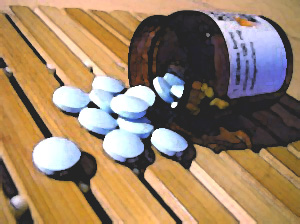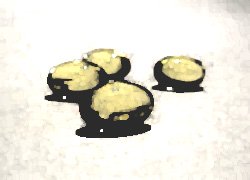“What are your options for bipolar medicine?”
Let's talk about the current bipolar medicine available today and the benefits and drawbacks. In medicine, every medication has its side effects: same with bipolar medicine. So, talk to your doctor after you read this article before making a choice!
In the end, if the cons of medicine are better than suffering from bipolar disorder, you may choose the medicine.
However, there is also good news beyond medicine.
Here we go…
Here are the basic bipolar ‘medicines’ available:
Lithium salts
Mood stabilizers

Anti-psychotic drugs
Psychotherapy
Antidepressants
Medical marijuana
Electro-convulsive therapy
Omega-3 fatty acids
Complementary and alternative treatments
Let's take a closer look...
Lithium salts
No, not table salt. So, before you reach for the salt shaker…
Lithium salts have been a successful bipolar medicine first discovered in 1949. The FDA (Food and Drug Administration) approved it in 1970. There are 2 kinds of lithium salts used as bipolar medicine: lithium carbonate (mostly used) and lithium citrate (only sometimes used).
A third kind of lithium salt is also used as bipolar medicine and is available without a prescription. Lithium orotate is sometimes sold as "organic lithium" by nutritionists, as well as under many brand names. However, there isn’t much evidence for its success over lithium carbonate. People suffering from bipolar disorder and using the orotate form as bipolar medicine have complained that it doesn’t work as well as the lithium carbonate.
How does Lithium work?
Lithium salt balances your neurotransmitters (pathways to your brain that carry important information.)
It’s like taking out the potholes on the highway.
Some examples of neurotransmitters:
Acetylcholine - voluntary movement of the muscles
Norepinephrine - wakefulness or arousal
Dopamine - voluntary movement and emotional arousal
Serotonin - memory, emotions, wakefulness, sleep and temperature regulation
GABA (gamma aminobutyric acid) - motor behaviour
Glycine - spinal reflexes and motor behaviour
Neuromodulators - sensory transmission-especially pain
Are there any side effects of Lithium salt used as bipolar medicine?
Lithium can cause nausea, diarrhea, memory problems, and weight gain. Higher doses equal more side effects, but lower doses have little to no side effects.
Mood stabilizers
Mood stabilizers as bipolar medicine are used only to treat the mania. So, on the other hand, to treat the periods of depression, antidepressants are used. It is dangerous to use antidepressants only or before being on a mood stabilizer first. So, antidepressants are recommended to be used only after you have been on a mood stabilizer so there is no risk of switching to mania. Talk to your doctor more about this.
Anti-psychotic drugs
Many times doctors would use anti-psychotic drugs as bipolar medicine to save your life if you would become violent or psychotic. In the emergency room, a wafer form is often put in a patient’s mouth. Anti-psychotic drugs are FDA approved. Here are some sample drugs under a brand name: Abilify, Symbyax, and Geodon. Ask your doctor for more info.
Lamotrigine (marketed as ‘Lamictal’ by GlaxoSmithKline, 2003) is also an anti-psychotic drug used which also was the first bipolar medicine to be approved by the FDA since Lithium. Lamotrigine treats bipolar depression without triggering mania, hypomania, mixed states, or rapid-cycling, and the 2002 American Psychiatric Association guidelines recommended lamotrigine as a first-line treatment for acute depression in bipolar disorder as well as a maintenance therapy. However, on the label, there is nothing about it treating acute symptoms.
What are the side effects of anti-psychotic drugs used as bipolar medicine?
The most common side effects are drowsiness, weight gain, increase in blood lipids, and hyperglycaemia. Anti-psychotic drugs can also cause restlessness, muscular spasms of neck, eyes, tongue, or jaw; (more frequent in children), drug-induced muscle stiffness, shuffling gait, drooling, tremor; (more common in adults and the elderly), and involuntary, irregular muscle movements, usually in the face.
Anti-psychotic drugs can also cause something in about 5% of young patients called ‘tardive dyskinesia’. Huh? Okay, basically it is repetitive, involuntary, purposeless movements. This can be frowning, sticking out your tongue, smacking your lips, puckering and frequently blinking your eyes. Your arms, legs and hips can also move around all over the place. If your fingers are moving around, it can look like you are playing an invisible guitar or piano. It’s a lot like Parkinson’s disease.
Your doctor must carefully watch out for any of your side effects that he/she can reduce the dosage or switch to another medication. If you suffer from any side effects, TELL YOUR DOCTOR.
Antidepressants in bipolar disorder?
There is a controversy in using antidepressants as a bipolar medicine because of research done by Fredrick K. Goodwin M.D., coauthor of “Manic Depressive Illness” with Kay Redfield Jamison PhD and the NIMH's Robert M. Post. Their results showed that use of antidepressants (over months to years) made the bipolar illness worse compared to mood stabilizers alone in both bipolar I and bipolar II disorders.
Electro-convulsive therapy
Electro-convulsive therapy (ECT) is another bipolar ‘medicine’ which has a 60-70% success rate. Even though it has a high success rate, doctors tend to reluctantly prescribe it. Why? It is because of the side-effects and possible temporary memory loss complications of ECT, especially when repeated treatments ("maintenance ECT") are done.
Medical marijuana?
Some medical and mental health professionals believe that cannabis (marijuana) should be avoided as a bipolar medicine. Dr. Paul Meier, founder of the Meier Clinics, has found in his experience that it only made things worse for his patients.
Complementary and alternative treatments
Alternative treatments for bipolar medicine are highly controversial. Why? Because this doesn’t require using drugs which is what we’ve been told our bodies need. However, if you were to take the proper requirement of what your body needs to let your engine purr - such as vitamins, dietary minerals, enzymes, antioxidants, amino acids, essential fatty acids, and dietary fibre – well, you’d find a huge change in your mental health!
Proper nutrition is less likely to cause dangerous side-effects or harm, as it’s using only molecules that are normally present in your body through healthy diet or normal metabolism.
Other complimentary treatments include exercise and meditation. (Read our articles on ‘Depression and Exercise’ and ‘Depression and Spirituality’ for more info.) (They open in a new window).
Omega-3 fatty acids

There has been some amazing research done with Omega 3 fatty acids and bipolar disorder. For more info, read the following article: ‘Bipolar Disorder Success Story’ (Opens in a new window).
Psychotherapy
Psychotherapy such as ‘interpersonal and social rhythm therapy’, ‘family focused therapy’, ‘cognitive therapy’, ‘interpersonal group therapy’ and ‘psycho-education’ have been found to be effective when used with bipolar medicine. However, you need to be symptom-free to benefit from psychotherapy. This may not cure your bipolar illness, but psychotherapy can help you cope with how this disorder may have disrupted your life, your job, relationships, and self-esteem. You not only can get such therapy from psychiatrists but also from social workers, psychologists and other licensed counsellors.
So, to wrap it up: Here are the sample bipolar ‘medicines’ we've researched:
Lithium salts, mood stabilizers, anti-psychotic drugs, antidepressants, psychotherapy, medical marijuana, electro-convulsive therapy, omega-3 fatty acids, and complementary and alternative treatments.
Now, ask your doctor about your options.
There is hope! You are worth it!
Look below for links for more helpful research, counselling resources and support group listings.
Related Articles:
"Symptoms of Bipolar Disorder"
"Bid Loneliness and Isolation Farewell with Depression Group Support"
"6 Powerful Ingredients to Cure Your Depression"
View our Complete Depresion Article Index
Back to Home from Bipolar Medicine
Sources:
"Lamotrigine". (2006, October 2). In Wikipedia, The Free Encyclopedia. Retrieved 21:07, October 2, 2006, from http://en.wikipedia.org/
"Major advances in bipolar disorder", Medical Journal of Australia, 2004, http://www.mja.com.au/
Mood Disorders Outpatient Program, Bakirkoy State Hospital for Research and Training in Neurology & Psychiatry, Istanbul 34747, Turkey. "Bipolar depression: an overview", Oral ET, Vahip S., IDrugs. 2004 Sep;7(9):846-50. Retrieved October 2, 2006, from http://www.ncbi.nlm.nih.gov/
"Orthomolecular medicine". (2006, October 2). In Wikipedia, The Free Encyclopedia. Retrieved 21:08, October 2, 2006, from http://en.wikipedia.org/
"Treatment of bipolar disorder". (2006, September 20). In Wikipedia, The Free Encyclopedia. Retrieved 20:36, October 2, 2006, from http://en.wikipedia.org/
“What is the role of food in preventing depression and improving mood, performance and cognitive function?” / Med J Aust 2000; 173 Suppl 6 November: S104-S105/ Accessed Oct 2, 2006 / http://www.mja.com.au/
Back to Home

